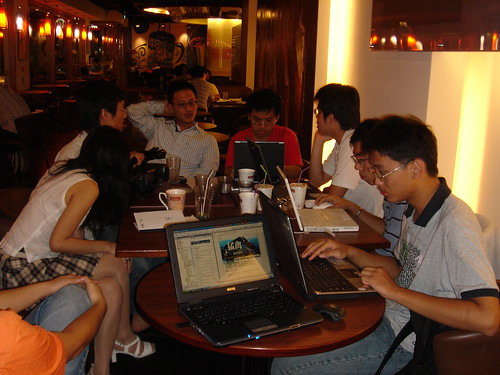Will this school year be the same old, same old as far as ICT is concerned? If you’re in England, you may be introducing a new scheme of work, but that doesn't necessarily mean very much – it could just be another case of old wine in new bottles.
I’m assuming that your ICT work is at least partially project-based (and if it isn’t, I humbly suggest you take a look at that. Here’s a good article to get you started: Why teach with project-based learning?). So the issue is: how can you make the project work more engaging and even more useful?
I called this article “Introduce a new project”, but that could also be taken to mean “Introduce a new style of project”. The main thing is to do something different – just one thing – even if what you’re doing already works OK.
 Project-based learning can take all sorts of forms! Photo by By Ted (Hsiang-Tai) / 眼鏡虎 http://www.flickr.com/photos/htchien/
Project-based learning can take all sorts of forms! Photo by By Ted (Hsiang-Tai) / 眼鏡虎 http://www.flickr.com/photos/htchien/
Now, I tend to adhere to the “If it ain’t broke, don’t fix it” school of thought. However, sometimes it’s a good idea to fix it anyway, because it can keep everyone on their toes (including teachers I mean) and keeps them enthusiastic, because most people like a challenge. I always wondered how some of my teachers could bear dictating out the same old set of notes year in year out, generation in generation out. (You think I’m exaggerating? Someone told me, when he went back to his old school as a teacher, he heard the teacher in the next room reading out the same notes she’d used with his class twenty years previously.) Well, running the same project year in year out is also going to wear a bit thin, no matter how exciting it once might have been.
Some ideas for shaking things up a bit:
- Ask colleagues to come up with ideas for projects they would like to manage themselves. (See 31 Days to Become a Better Ed Tech Leader -- Day 2: Delegate a Unit of Work and 31 Days to Become a Better Ed Tech Leader – Delegation Case Study.)
- Ask students to come up with some ideas for projects. Maybe even make that the focus of a competition.
- Extend the project so that it takes twice as long as it currently does, to allow for some really in-depth and extensive research.
- Shorten the length of the project to half the time currently allocated, to promote critical thinking and decision-making skills under pressure.
- Make the project community-based – in a real, not a tokenistic way. I was most impressed with a school I visited in Italy, where their senior students had examined a run-down park (effectively taken over by alcoholics) and after some research presented a case to the local council on why and how it should be restored. The council acted on the students’ advice, and the park was transformed into a haven of peace and beauty.
- Take the project outside. I could teach most if not all of every ICT scheme of work I’ve looked at by spending half the lessons in the local park. Why confine yourself and your students to a classroom?
- Have range of projects to choose from, and throw a die to decide which one is going to be next. Scary – but it worked pretty well for The Diceman! Hmm – most of the time, anyway!
Whatever you do, make sure the project meets its curriculum goals, and has rigour and accountability. It can’t just be an excuse for kids having a great time without actually learning anything.

